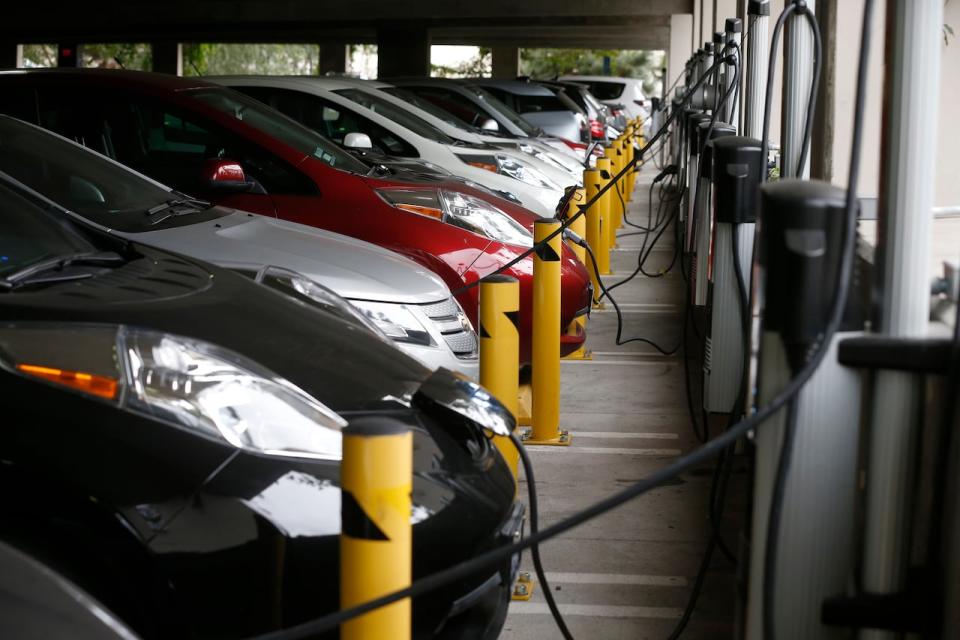EV sales are still growing. So why are carmakers pulling back?

Some of the headlines about electric vehicles lately might give the impression that the market is headed for a crash. But new data shows electric vehicle sales are still growing in Canada, and have hit a record high.
More than 65,000 new zero-emission vehicles (ZEVs) — meaning battery electric and plug-in hybrid electric — were registered in the second quarter of this year, according to Statistics Canada. That's equal to 12.9 per cent of all vehicle registrations. Over the same period five years ago, ZEVs made up just 3.4 per cent.
The trend hasn't been entirely linear, but it's clear sales are still growing — though perhaps not as quickly as had been expected.
"We're past the early adopter phase," said J.D. Ney at the market research firm J.D. Power, referring to customers who buy into new technologies before most people.
"The next step, though, is to convince a much wider swath of Canadians that electrification is right for them."
That mainstream buyer, Ney says, is less wealthy and more practical, and it will take extra effort to convince them to ditch gas-powered cars.
When J.D. Power surveyed new vehicle shoppers in Canada, respondents who said they wouldn't consider an EV said the models are still too expensive, and they worry about how far they can travel and how difficult it will be to charge the battery.
"If I make a mistake buying an EV or it doesn't suit my lifestyle, that's a $65,000 problem," Ney said. "It's the second biggest purchase that most Canadians will make. And so I think they are rightfully cautious."
That could explain why sales of plug-in hybrids (PHEVs) are revving up, with new registrations jumping 43.1 per cent in the second quarter compared with the same period last year. PHEVs allow drivers to travel moderate distances on electric power. Once the battery is depleted, the gas-powered engine can take over. It's a compromise that may appeal to customers concerned about range and charging infrastructure, offering a less risky choice than going all-electric.
Shifting gears
Just a few years ago, carmakers were investing billions of dollars into their electric lineups, and pledging they would soon stop building gas-powered cars. But customers aren't going fully electric as quickly as predicted, so many companies are making adjustments to better meet demand.
General Motors has scaled back its electric vehicle production this year and will build an estimated 50,000 fewer EVs. Ford is shifting its strategy, stalling plans for an electric SUV and building a hybrid version instead. Despite all that, carmakers insist they're still committed to the cause.
WATCH | Slower growth than expected:
"The thought of changing to electrical propulsion after decades of driving an internal combustion engine is a big step," Volvo Cars CEO Jim Rowan said earlier this month, noting the company will pull back slightly on its EV goals. "We will be ready to go fully electric this decade, but if the market infrastructure and customer acceptance is not quite there we can allow that to take a few more years."
For those customers hoping overseas carmakers like China's BYD would bring cheaper EV models to North America, that may also take a little longer. Last month, the federal government slapped 100 per cent tariffs on Chinese-made EVs. The move is meant to give companies here time to build up domestic EV manufacturing — and to protect the billions of dollars Ottawa has invested in the supply chain.
"We are building an EV industry here. We have all of the ingredients for Canada to succeed in this sector," said Brian Kingston, president of the Canadian Vehicle Manufacturers' Association. "I'm convinced we'll continue to see a growth in EV adoption, but we do have to address some of those barriers to demand."
Laying out a road map
The federal government introduced new regulations meant to speed up the transition to electric, pushing automakers to build enough EVs to meet demand. The policy says by 2026, 20 per cent of new cars sold should be zero emission. The target jumps to 60 per cent by 2030, and 100 per cent by 2035.
Carmakers, however, have said those goals won't be achievable unless Ottawa does more to boost charging infrastructure and address EV affordability.
The federal government has offered financial incentives since 2019. The program offers $5,000 toward the purchase of an eligible zero-emission vehicle.

J.D. Ney at the market research firm J.D. Power, says electric vehicles have passed the early adopter phase. (Jared Thomas/CBC)
Some provinces have their own incentives that offer additional savings on top of federal rebates. Quebec's is the most generous at $7,000. It's clearly made a difference — EV adoption in the province is soaring — but the subsidies will decrease starting next year before being phased out completely.
There are also incentives available in the Atlantic provinces, Manitoba, B.C. and the Yukon.
Still, the upfront cost of EVs is enough to give mainstream buyers sticker shock. A small SUV like the gas-powered Toyota Rav4 costs about $36,215, while the all-electric Hyundai Ioniq 5 has a price tag of $57,676 (without incentives).
Kingston says as technology improves, he expects that price gap to close toward the end of the decade.
In a recent report, the Parliamentary Budget Officer said to spark consumer demand and meet federal targets, overall costs of EVs must drop by 31 per cent.
There is another simple factor that could persuade more Canadians to choose an EV, according to Ney.
"Fifty per cent of Canadians have never even sat in an EV… so there's a large educational curve. Between manufacturers, policymakers, lobby groups, that's going to be one of the big tasks in the next couple of years."

 Yahoo Finance
Yahoo Finance 